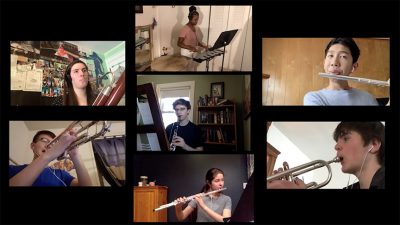As COVID-19 transformed Boston into a virtual and socially distanced world, the city’s music students kept on playing.

The North End Music and Performing Arts Center closed its doors before the city shut down officially, said Executive Director Sherri Snow.
“We were one of the first organizations to actually close,” Snow said. “We halted all of our programs and were fortunate enough to launch a virtual platform within three days.”
She said about 70% of NEMPAC’s students continued to take lessons during the pandemic. The organization oversees more than 1,500 students every week through its community music school and its partnership with Boston Public Schools.
Even before COVID-19, Snow said NEMPAC was working on a virtual platform in order to stay competitive with other music schools that were already making that move. Still, virtual lessons aren’t without their difficulties.
“The one thing about music is that it unites us all, it gives us these personal human experiences,” Snow said, “and I think that sometimes it’s hard to convey or relate to someone through a screen online.”
Snow added that the pandemic made it difficult to maintain equity of access to lessons among students. Internet access has been a challenge-point for Boston families since the start of the pandemic.
“You’re only making school music accessible via a computer or a screen, and not every child or teen in Boston has a computer,” Snow said. “We tried to really support accessibility at home, realizing that every student may not have an instrument, so we created an instrument fund last year.”
Along with the instrument fund, NEMPAC awarded more than $19,000 in need-based financial aid from 2019 to 2020.
NEMPAC returned to in-person instruction in September, adding COVID-19 safety protocols such as screening students and taping off sitting areas in practice rooms to ensure social distancing, Snow added.
But Snow said vocal, brass and woodwind instruction remains remote due to the increased risk of COVID-19 transmission.
“So much about vocal technique is having our instructor see how they’re producing their vowels and see the tension on their jaw and their lips and their mouth,” Snow said. “With a mask on, it’s impossible to do those things.”
In addition to its music school, NEMPAC operates a performing arts center that Snow said usually hosts up to 30 events every year, but there aren’t many in-person events currently.
“We had to get creative,” Snow said.
From May through October, NEMPAC partnered with Tresca, a North End restaurant, to present “Opera from the Balcony.” Each week, opera singers sang down on Hanover Street from the safety of the restaurant’s balcony.
“People were just stopping and in awe,” Snow said, “and some people were crying, just so moved by hearing this live vocal music.”
Sarah Spinella, chief advancement officer at Community Music Center of Boston, said the organization’s social media has reached a larger audience since the pandemic hit last year.
“Our YouTube has exploded,” Spinella said. “Our subscribers, I think, have tripled in the past year.”
CMCB moved to remote programming last March, and similar to NEMPAC, it was already working on remote instruction, Spinella said. She cited other advantages of the virtual format, some of which she’s experienced as a vocal student herself.
“When we went online, it meant that I could just be in the comfort of my own home and not singing where my fellow staff members can hear me in my office,” she said.
On the other hand, Spinella said older, more advanced students adjusted better to virtual lessons than beginners.
“I also took string lessons as a kid, I played viola” Spinella said, “and in those early years your teacher has to come over and physically touch your hand, and we don’t allow that anymore.”
To combat this, CMCB created instrument tuning videos and began allowing families to bring in instruments to tune during “office hours,” Spinella said.
As chief advancement officer, Spinella oversees CMCB’s fundraising. She said some donors are able to give more because they didn’t spend as much money during COVID-19, while others had to cut back because of financial difficulties.
Spinella said CMCB considered dipping into its endowment to avoid laying off staff, but the organization received a Paycheck Protection Program loan to cover costs.
She added that the staff now meets once or twice a month to check in and stay in touch, which wasn’t necessary before COVID-19.
“It used to be that we’d just pass each other in the hallway, and I could just step into a class,” Spinella said. “Now it’s a lot harder to Zoom-bomb something and see and watch what’s happening.”

















































































































